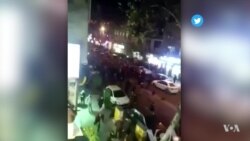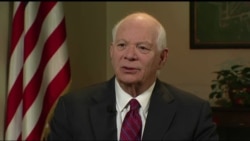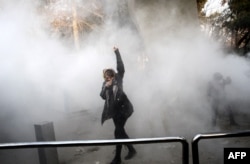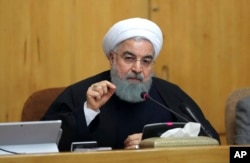Thousands of pro-government supporters held rallies Saturday across Iran for the fourth consecutive day, one day after Iran's foreign minister said a United Nations meeting was a "blunder" by the administration of U.S. President Donald Trump.
State television showed demonstrators in the cities of Amol, Semnam and Shadegan wielding Iranian flags and chanting slogans against the U.S., Israel and Britain. Rallies also were held in the provinces of Khuzestan, Semnan and West Azerbaijan.
Saturday's rallies were staged one day after a United Nations Security Council held an emergency meeting to discuss the protests at the request of the U.S. The U.S. was criticized at the meeting for requesting the session to discuss an issue that some member states said was an internal issue for Iran.
After the meeting, Iranian Foreign Minister Mohammad Javad Zarif tweeted, "The UNSC rebuffed the US' naked attempt to hijack its mandate ... Another FP (foreign policy) blunder for the Trump administration."
‘US is watching’
U.S. Ambassador to the U.N., Nikki Haley, praised the anti-government protesters at the meeting amid criticism the U.S. is meddling in Iran's domestic affairs.
Competing pro- and anti-government demonstrations have been taking place in Iran's major cities for the past week, resulting in the deaths of 22 people and the arrest of more than 1,000 others.
"The U.S. is watching what you do," Haley said to Iran in her statement in Friday's meeting. She called the protests a "spontaneous expression of fundamental human rights" and a "powerful exhibition of brave people who have become so fed up with their oppressive government that they are willing to risk their lives in protests."
Haley called on the Iranian government to stop censoring the voice of the Iranian public and to restore their access to the internet.
She also said the international community should do more to support the anti-government demonstrators. U.S. President Donald Trump has also tweeted his support for the protesters.
But critics of the U.S. position, including Russia and Iran itself, have said the protests are not the business of the international community.
Iran's ambassador, Gholamali Khoshroo, attended the meeting at the invitation of the Security Council. Speaking last, he said it is a "discredit" to the Security Council to hold such a meeting on Iran in the face of the conflicts taking place in Yemen and elsewhere in the Middle East.
WATCH: US Puts Iran 'on Notice'
Russia's deputy foreign minister, Sergei Ryabkov, criticized the U.S. push to hold Friday's meeting as an intrusion into Iranian affairs.
Meanwhile, the protests continue after Tehran's prayer leader urged authorities Friday to deal "firmly" with those responsible for sparking more than a week of anti-government rallies.
Iranian officials say a plot by the Central Intelligence Agency, Israel and Saudi Arabia is responsible for the unrest amid escalating tensions with the neighboring countries since Donald Trump won the U.S. presidency.
Need to tread carefully
In an interview with VOA contributor Greta Van Susteren, Democratic Senator Ben Cardin of Maryland cautioned that the the U.S. must walk a "delicate line" in response to allegations of provocation.
"We don't want to give them any ammunition for what they're saying. We know that the Iranians don't tell the truth about what is happening. Their people know that," Cardin said.
Cardin added: "I think it's important for us to keep a spotlight on the protesters and do everything we can to keep them safe and to take action against Iran if they violate basic human rights. I think the seeds for protest will remain unless the Iranian leaders change their course and allow the people basic human rights and basic economic freedoms."
WATCH: US Senator Ben Cardin discusses Iran unrest
The U.S. is promising support for anti-government protesters. A White House official Thursday said the U.S. would look for "actionable information" and seek to impose new sanctions against those responsible for stifling the protests.
The State Department also said it would not stand by idly.
"We have ample authorities to hold accountable those who commit violence against protesters, contribute to censorship or steal from the people of Iran," it said in a statement. "To the regime's victims, we say: You will not be forgotten."
New US sanctions
Though not tied directly to the protests, the U.S. Thursday sanctioned five Iranian companies linked to Tehran’s ballistic missile program.
Ahead of Friday's U.N. meeting, four U.N. human rights experts called on Iranian authorities to respect the right of protestors and said they are "extremely concerned" over the deaths and arrests that have occurred since the protests began.
The experts also expressed concern that the government has reportedly blocked the internet on mobile networks and shut down social media platforms in an effort to suppress the anti-government protests.
"Communication blackouts constitute a serious violation of fundamental rights," they said.
Iranian public’s discontent
The protests, which seemed to erupt spontaneously on December 28, have spread to many of Iran's smaller cities, towns and rural areas, with protesters focused on economic hardships and government corruption.
But Iranian officials on Thursday insisted the wave of anti-government protests had waned.
Still, U.S. intelligence officials warn Tehran is at a crossroads, noting the protests are the biggest outpouring of public discontent since Iranians took to the streets in 2009 following a disputed presidential election.
“The protests are symptomatic of long-standing grievances that have been left to fester,” an intelligence official told VOA on condition of anonymity. “Will it address the legitimate concerns of its people or suppress the voices of its own populace?"
“What is clear is that these concerns are not going away," the official said.
Critics of Iranian President Hassan Rouhani, pointing to rising prices for key commodities like fuel, bread and eggs, say he has abandoned the poor.
And even Ali Akbar Velayati, an adviser to Iran's supreme leader, told the semiofficial ISNA news agency, "The people's main demand now is for the government and officials to deal with the economic problems."
Growing US pressure on Iran?
In the meantime, Iran could face additional economic pressure from Washington.
Trump is set to decide next week whether to continue to waive sanctions against Iran that were suspended under the 2015 international agreement to curb Iran's nuclear weapons development. The U.S. president has repeatedly attacked the agreement and assailed Tehran's military actions in Syria, Iran and Yemen.
But some analysts warn the administration runs a risk of taking too harsh a line on Iran and seeing it backfire.
"There's really no reason for us to not waive the nuclear sanctions now," said Michael Eisenstadt, director of the Military and Security Studies program at the Washington Institute for Near East Policy.
"Don't pull out of JCPOA [Joint Comprehensive Plan of Action nuclear deal], because that will redirect the attention of the Iranian people from the regime's inability to solve their financial problems to us," Eisenstadt said. "We shouldn't make the United States the issue here."
VOA's national security correspondent Jeff Seldin and U.N. correspondent Margaret Besheer contributed to this report.










